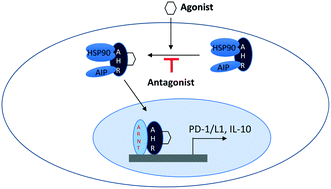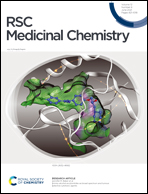Recent advances in the development of AHR antagonists in immuno-oncology
Abstract
The arylhydrocarbon receptor (AHR) is a ligand activated transcription factor that controls the expression of a number of immunosuppressive signaling molecules, including the immune checkpoint proteins PD-1/L1 and cytokine IL-10. AHR activation also stimulates the formation and recruitment of tolerogenic dendritic cells, tumor associated macrophages, and regulatory T cells in the tumor microenvironment, which restrains antitumoral immune response. Overexpression of AHR has been observed in a number of different types of cancer and suggested to contribute to immune dysfunction and cancer progression. One prominent endogenous ligand of AHR is the oncometabolite kynurenine, a product of tryptophan metabolism catalyzed by the dioxygenases IDO1 and TDO that are often aberrantly activated in cancer. AHR has gained significant interest as a drug target for the development of novel small molecule cancer immunotherapies, as evidenced by the advancement of two clinical candidates into phase 1 clinical trials in patients with advanced cancer. Discussed in this Review is a brief background of AHR in immuno-oncology and the recent progress in the discovery and development of AHR antagonists.



 Please wait while we load your content...
Please wait while we load your content...